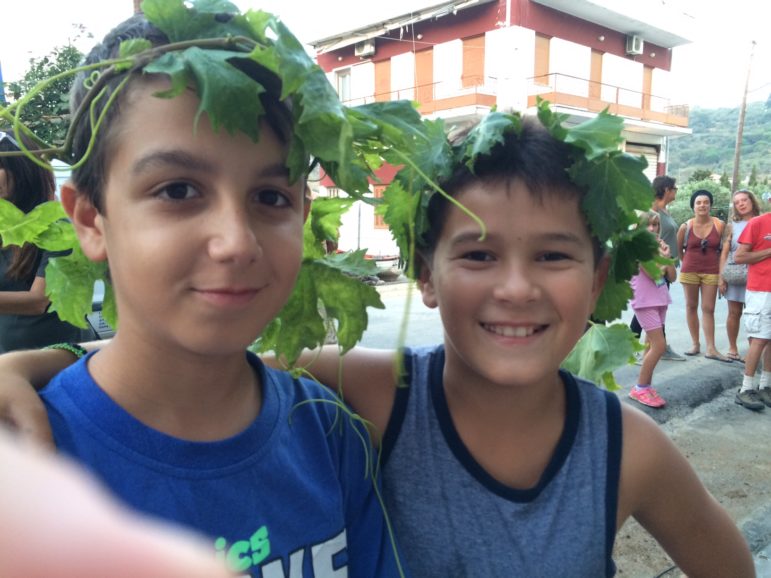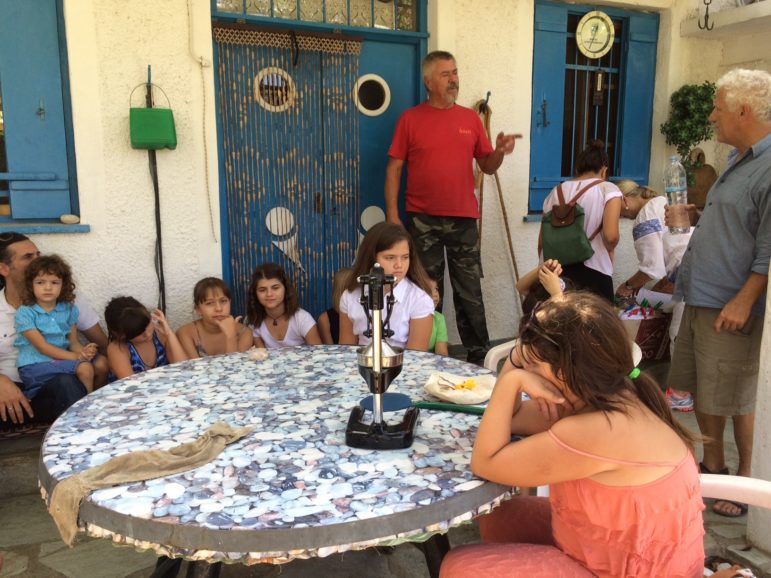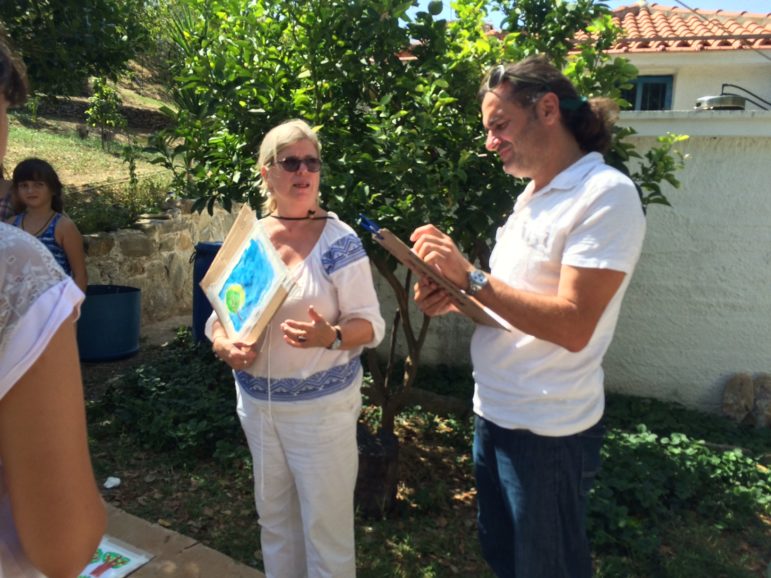
Photos by Stell Simonton
Community organizations on Skopelos Island in Greece are addressing what they see as a gap in the country’s education system — lack of art and music— as well as a disappearance of older art forms and practices. Here, kids wearing grape leaves take part in a program by the Sporades Islands Center for Sustainable Life.
SKOPELOS ISLAND, Greece — On a sunny Saturday afternoon, Greek schoolteacher Christos Paleologos sat in a vineyard with a dozen elementary and middle-school-age kids. They were having an outdoor art lesson.
“Art education [in Greek schools] has been degraded and underappreciated,” said Paleologos, who teaches physics, chemistry and biology in one of the two high schools on Skopelos Island. Science and math classes have edged the arts out of schools, he said.
Just as many U.S. public schools are criticized for their lack of music, art and physical education, Greek schools are also criticized. Economic problems in Greece have also left schools with fewer resources.
Out-of-school organizations have stepped up to fill what’s seen as a gap in education.
The event in the vineyard was arranged by Paleologos in partnership with the Sporades Islands Center for Sustainable Life. The goal was both to teach children about traditional Greek practices and to expand their art education.

Retired ship captain Vaggelis Skiathitis talks about the process of cultivating grapes.
Vineyard owner Vaggelis Skiathitis, a retired ship captain, talked to the kids about the process of cultivating grapes. Then artist Judith Atkinson, who was visiting from Canada, led a watercolor lesson in which the children painted grape vines, olive trees, plum trees and butterflies that surrounded them, as well as the deep blue sky above this island in the Aegean Sea.
Skopelos, with a population of about 5,000 permanent residents, was once a wine-making, ship-building, olive-oil-producing economy. Now the island is reliant on tourism.
The center, founded by Tom Amygdalitsis, works to preserve knowledge of a way of life, fast disappearing, that produced beautiful crafts and abundant foodstuffs and relied on an intimate knowledge of nature.
Also in the vineyard was Roger Fox, who moved with his wife from Britain 11 years ago. Skopelos, part of the Sporades group of islands, draws retirees from Europe. Fox, a retired actor, was former chief executive officer of Voluntary Arts, a U.K. organization devoted to supporting arts and crafts.
Young people on the island are rich in family, Fox said. They have a “massive safety net” because they live in extended families full of grandparents, aunts, uncles and cousins, he said.
“What they don’t have are enough educational or social opportunities,” he said. When tourist season ends, many businesses close, jobs end, and the island is more isolated.
The center has also sponsored other activities with youth. A group recently went scavenging for wild greens with elderly people who taught them to recognize the plants and know which were safe to eat. Gathering wild greens, known as horta, was once a common practice, Amygdalitsis said.
Skopelos is also home to the Skopelos International Film Festival for Youth, part of the American nonprofit Skopelos Foundation for the Arts. A weeklong program each summer puts groups of six to eight students with a professional filmmaker. The films they create are screened at the end of the week to an audience in Skopelos Town.
The festival began in 2009 with private donors and Kickstarter funding, serving 20 Greek and two American students. This summer it served 80 students with 12 filmmakers from several countries.

Canadian artist Judith Atkinson (left) leads a Saturday art lesson in a vineyard along with local teacher Christos Paleologos. The event was organized in partnership with the Sporades Islands Center for Sustainable Life.
Young people are also involved in a traditional dance festival that has been held for the past four years, the Folklore Dance Festival “Diamantes Paliaologos.”
“We need to cultivate creativity,” Paleologos said.
During the recent grape harvest festival, the Sporades Center gave kids a chance to stomp grapes, the traditional method of pressing juice from grapes to make wine. It also led a demonstration in making a pudding known as moustalevria from the juice.






























